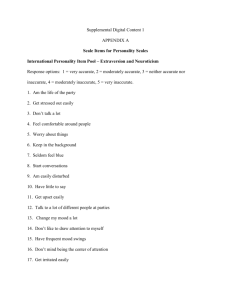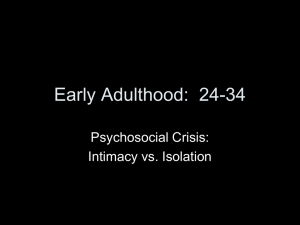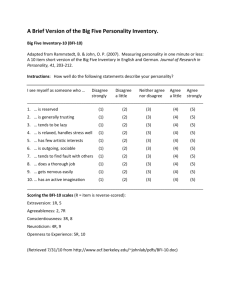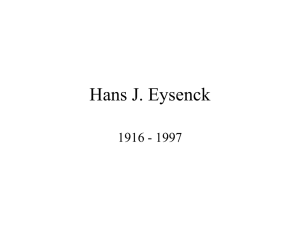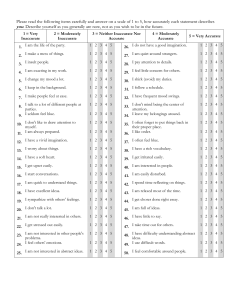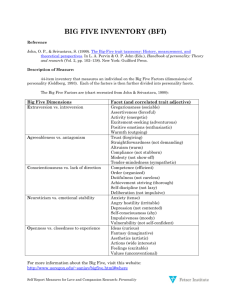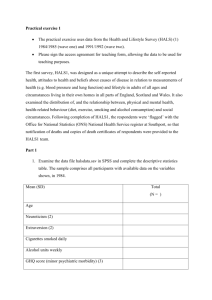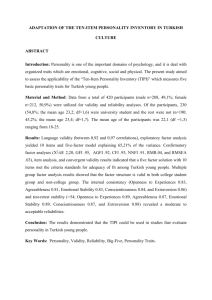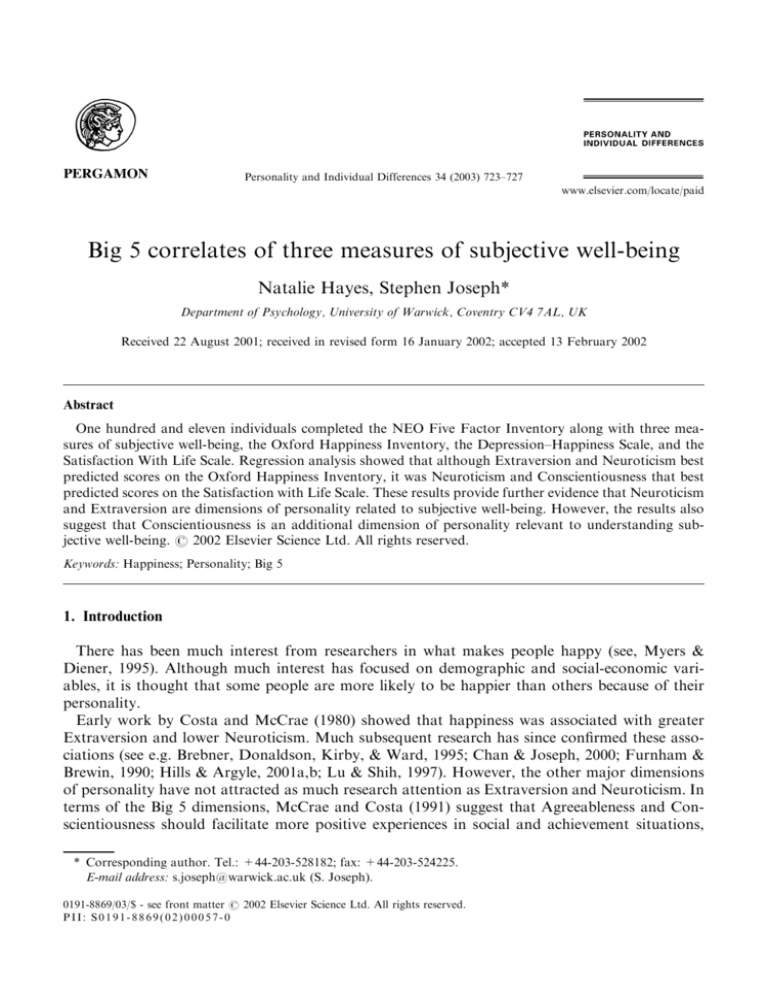
Personality and Individual Differences 34 (2003) 723–727
www.elsevier.com/locate/paid
Big 5 correlates of three measures of subjective well-being
Natalie Hayes, Stephen Joseph*
Department of Psychology, University of Warwick, Coventry CV4 7AL, UK
Received 22 August 2001; received in revised form 16 January 2002; accepted 13 February 2002
Abstract
One hundred and eleven individuals completed the NEO Five Factor Inventory along with three measures of subjective well-being, the Oxford Happiness Inventory, the Depression–Happiness Scale, and the
Satisfaction With Life Scale. Regression analysis showed that although Extraversion and Neuroticism best
predicted scores on the Oxford Happiness Inventory, it was Neuroticism and Conscientiousness that best
predicted scores on the Satisfaction with Life Scale. These results provide further evidence that Neuroticism
and Extraversion are dimensions of personality related to subjective well-being. However, the results also
suggest that Conscientiousness is an additional dimension of personality relevant to understanding subjective well-being. # 2002 Elsevier Science Ltd. All rights reserved.
Keywords: Happiness; Personality; Big 5
1. Introduction
There has been much interest from researchers in what makes people happy (see, Myers &
Diener, 1995). Although much interest has focused on demographic and social-economic variables, it is thought that some people are more likely to be happier than others because of their
personality.
Early work by Costa and McCrae (1980) showed that happiness was associated with greater
Extraversion and lower Neuroticism. Much subsequent research has since confirmed these associations (see e.g. Brebner, Donaldson, Kirby, & Ward, 1995; Chan & Joseph, 2000; Furnham &
Brewin, 1990; Hills & Argyle, 2001a,b; Lu & Shih, 1997). However, the other major dimensions
of personality have not attracted as much research attention as Extraversion and Neuroticism. In
terms of the Big 5 dimensions, McCrae and Costa (1991) suggest that Agreeableness and Conscientiousness should facilitate more positive experiences in social and achievement situations,
* Corresponding author. Tel.: +44-203-528182; fax: +44-203-524225.
E-mail address: s.joseph@warwick.ac.uk (S. Joseph).
0191-8869/03/$ - see front matter # 2002 Elsevier Science Ltd. All rights reserved.
PII: S0191-8869(02)00057-0
724
N. Hayes, S. Joseph / Personality and Individual Differences 34 (2003) 723–727
respectively, which in turn increase subjective well-being. Openness to experience, however,
should lead a person to experience both more positive and negative emotional states. No direct
association should therefore be expected with Openness to experience.
DeNeve and Cooper (1998) in their meta-analysis of single trait measures associated with subjective well being provide evidence consistent with McCrae and Costa’s suggestions. In particular,
DeNeve and Copper (1998) show that Extraversion and Neuroticism are the strongest Big 5
predictors of happiness and that Neuroticism and Conscientiousness are the strongest Big 5 predictors of life satisfaction. There now remains a need for further investigation to confirm these
findings. The aim of the present research was to extend the investigation of personality correlates
of happiness to the Big 5 personality dimensions, Extraversion, Neuroticism, Conscientiousness,
Agreeableness, and Openness.
2. Method
One hundred and twenty nine residents of Warwickshire and their friends and acquaintances
were recruited by personal contact with a variety of social and leisure groups at the University of
Warwick. Of these, 111 (36 men, 75 women, mean age=37.77, SD=17.45) fully completed a
battery of measures, which included: the 60-item NEO Five Factor Inventory (NEO-FFI: Costa
& McCrae, 1992). The NEO-FFI yields scores for Extraversion (E), Neuroticism (N), Openness
(O), Concientiousness (C) and Agreeableness (A). Respondents also completed the 29-item
Oxford Happiness Inventory (OHI: Argyle, Martin, & Crossland, 1989), the 25-item DepressionHappiness Scale (DHS: Joseph & Lewis, 1998), and the Satisfaction With Life Scale (SWLS:
Diener, Emmons, Larsen, & Griffin, 1985). The SWLS assess the cognitive/evaluative aspect of
happiness whereas both the OHI and DHS are global measures of happiness assessing cognitive
and affective aspects. Higher scores on the OHI, DHS, and SWLS indicate greater subjective
well-being.
3. Results
Correlations, with sex and age partialled out, were computed between scores on each of the
well-being measures. Scores on the DHS (mean=51.18, SD=14.83) and the OHI (mean=37.77,
SD=17.45) were highly associated (r=0.73, P< 0.001), and scores on the SWLS (mean=24.06,
SD=6.89) were associated with scores on the OHI (r=0.56, P<0.001) and the DHS (r=0.61,
P<0.001) confirming that these three measures are all tapping related constructs.
Correlations, with sex and age partialled out, between the NEO personality dimensions and the
well being measures are shown in Table 1. Higher scores on each of the subjective well-being measures were associated with greater Extraversion, lower Neuroticism, and higher Conscientiousness.
These results suggest that Conscientiousness, as well as Extraversion and Neuroticism, is a
dimension of personality related to subjective well-being. However, Conscientiousness was found
to be associated with scores on Neuroticism (r= 0.39, P<0.001) and Extraversion (r=0.39,
P<0.001) begging the question of whether Conscientiousness had any unique association with
happiness over and above what could be accounted for by Extraversion and Neuroticism. To

